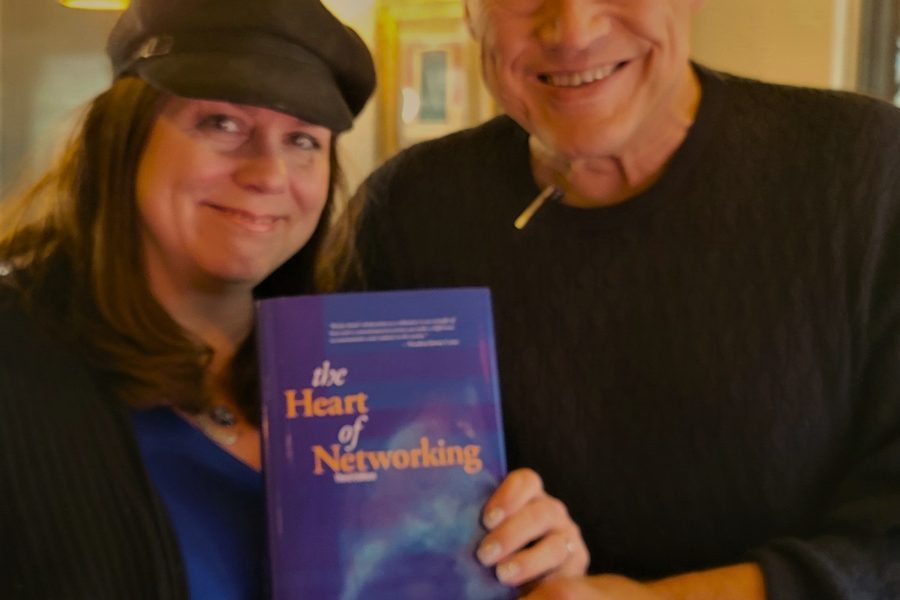
As a girl, Lauri Quinn Loewenberg loved to watch astronomer Carl Sagan host “Cosmos,” his TV show based on his bestselling book that explored the universe.
“He was my first crush at age 5. He was so handsome and I loved how he spoke,” recalls Lauri, a

holistic counselor and a leading authority on dream psychology. As author of the 2011 book, Dream On It, Lauri helps people interpret the meaning of their dreams so they can live more fulfilling lives.
“I want to be the Carl Sagan of dreaming. Just as he helped people to easily understand the universe, I want to help people to easily understand dreaming… our inner universe.”
Below, she shares her process of writing her book, now available in 10 languages, and which continues to garner significant media interest with major news outlets such as Dr. Oz, Anderson Cooper 360, The View, Good Morning America and The Today Show.
Q. What was the most memorable dream you ever had?
Lauri: There’s two. One propelled me into studying dream analysis and psychology because I wanted to know why. About two weeks after my grandfather died, I dreamed of him and in the dream I knew he was dead. I asked him, “What’s it like where you are?” He said, “I can’t tell you. All I can say is it is secure.” Then he hugged and went up the staircase and I woke up. I could still smell his Old Spice. It was such more than a dream – what was that?
The other dream was a lucid dream, which is where you are in the dream and you know it’s a dream. This one was after my second miscarriage and I was deep in a depression. I tell people when you become lucid in a dream to ask someone a question and see what answer you get. In this dream, there is no one in the dream. It’s just me standing in my son’s bedroom. I wanted to know so I just asked the dream itself, “Is there anything I need to know?” I felt this giant warm hand lift me up and say, “Everything is okay.” I woke up from that dream and I really think it helped in the depth of depression I was in.
One of the reasons dreams are so profound and meaningful and helpful is because your eyes are shut, the lights are out, the TV is off. You’ve turned out the outside world and as you sleep that stream of consciousness you’ve had with yourself all day goes deeper and deeper into yourself so when you are in the dream state, you are thinking in metaphors and symbols instead linear with words, so you don’t have distractions – you don’t have the phone ringing, or this talk you have to have with yourself. It’s your brutally honest core – a lot of people think dreams are the language of the soul. That’s a great expression.
Q. What made you decide to write this book?
Lauri: I had self-published two books before this one. I had been doing radio to promote my dream interpretation services for about 10 years and everyone would ask me, “Do you have a book?”
My first two were self-published and then a literary agent came to me and said, “I would like to get you published-published. “ Literally a month after she came to me we got a deal with St. Martin’s Press. I was out there a lot in radio and print so she thought I would be a good author for the book.
Q. What do you want people to get out of Dream on It?
Lauri: A couple of things – one, I want them after reading the book to have no doubt whatsoever that dreams have meaning. I want them to start paying attention to their dreams. Dreaming is a natural function of the brain. It’s your core authentic self. Your dreams are there to guide you through every single step of your life. Every little detail in your dream relates to your waking life. So if you pay attention to them, you will get a huge edge in life; you will live the life you were meant to have. Don’t ever disregard any dream you ever have.
The more horrible the dream, the more important it is. I have a very big chapter on nightmares because the nightmare is connected to our most difficult issues – the issues we mishandle and the issues we ignore. That’s the thing about dreams – you can turn a blind eye and pretend something is not going on all day, but when you go to sleep you are forced to face it and work it out.
Q. How has the field of dream psychology changed since you began doing this almost two decades ago?
Lauri: In the beginning I would get a lot of pushback from some people. One sect would say, “Only Jesus can interpret your dreams.” Another sect would say, “It’s only random misfiring’s of your brain. People have been so closed off to the possibilities that there is something to dreaming but in the last decade, it has  changed dramatically –way more people are open to their dreams having meaning than they used to be.
changed dramatically –way more people are open to their dreams having meaning than they used to be.
Q. What’s been the most surprising aspect of all your research for Dream on It?
Lauri: I hear the craziest stuff as you can imagine. The most surprising thing to me is how our dreams are such a renewable resource of wild and crazy imagery. The dreaming mind is so deep and creative, and it’s always coming up with something new. Even with all the thousands of people I’ve worked with over the last couple of decades, there’s always something original that I never heard before in a dream. It’s just amazing how deep the mind can go.
Q. What was your writing process like?
Lauri: It was a nine-month deadline, and they gave me free reign in terms of how I wanted to put it together. What I wanted to do differently with this book than the first two books was to do the chapters in categories – how different types of dreams are connected to a different part of your life.
- The animal chapter dream is all about how the different animals in your dreams are connected to your different behaviors.
- The people chapter dream is all about how the different people in your dreams symbolize different roles you play in life.
- The house and home chapter dream is all about your state of mind and your self-image. So each category of dream can be connected to a different part of the self.
Q. Is there one category that is more dominant? What do people most commonly dream about?
Lauri. I would say people are the most popular themes in dreams. It can be anything from a celebrity to a classmate you haven’t seen in 20 years, so this chapter teaches you how you can find out what part of your personality that person is symbolizing.
Q. How important is storytelling to getting points across in your book?
Lauri: I think it’s really important because there’s two layers of storytelling the book. One is the dream itself is a story. The dreams I feature in the book have a storyline, a main character, a conflict; they don’t always have a solution, but they have a timeline. The other layer of storytelling is telling the story of how the dream reflects the person’s personal story right now – where they are in their life; what’s going on in their life, so you kind of get two stories in one with each dream I cover.
Q. Why do some people never remember their dreams?
Lauri: They don’t give themselves time to remember. Creative people – the writers, the musicians, the artists – have great regard for their dreams – they’re going to remember them more. Your left-brain people – your investment banker, don’t remember their dreams as much. That’s not to say they can’t start remembering — you just have to give them time in the morning when you wake up.
Before you even roll out of bed, you want to stay in the same position. Don’t move; give yourself three to five minutes still time. Don’t think about anything. Stay quiet and the dream will come back to you. Make this part of your morning routine and you’ll start remembering all your dreams.
Q. How do you handle the science of your discipline – explaining it to people in a way where you won’t lose them?
Lauri: I only touch on briefly in the introduction of what’s going on in the dream physiologically just to give it a foundation. Dreaming is a very complicated process – the falling asleep and waking-up process is also very complicated – turning off certain parts of the brain and waking up others. I briefly talked about how different parts of the brain are active during the dream state so you can better understand why dreams are the way they are.
One of the questions I’m asked all the time is, “If dreams really had meaning, why don’t they say what they mean?” Here’s why: your brain is working differently when you are in REM than when you are awake. Your rational linear thought, which is controlled by the frontal cortex of the brain is dormant, which is why dreams don’t always seem in a straight line. The medulla, the emotional center of the brain, is hyperactive – that’s why dreams can be so vivid.
Q. You’ve been very successful marketing your book. Any tips on how authors can get media exposure?
Lauri: I started in radio. That’s a great start. You’ve got to be media savvy and not just talk about your book. With a non-fiction book, you have to make it engaging between you and your interviewer. You want to make it relatable to viewers and listeners. The good thing about my book is people do dream and wonder – I had that built-in going for me.
I wrote this book back in 2011, but I can still use it to get on interviews but I can tie in to what is going on in the news such as when Robin Williams died. I let media outlets know I could talk about the warning signs that dreams give you that you are heading into a depression. For example, we all dream in colors. But, if you are going through a very depressing time, the dream will be in black and white or the colors will be muted. You’ll dream of rain; you’ll dream of storms; you’ll have a lot of the color blue, because that is symbolic of the blues. Someone in your dream (or you) will be crying.
You also need to ask yourself, “Can I be a good call-in guest?” Radio stations love that. It’s not as popular on TV. Some TV shows will do viewer dreams, but usually TV is just you and the host talking back and forth. Radio loves it when you can be a guest who can drive calls. What I’ve been doing this for 15 years is that format of radio interview. People call in and tell me their dreams and I interpret them live on the spot.
Look for how to make yourself the perfect guest for call-ins. For example, if you are a Feng shui expert, have people call in with their design problems or even their personal life problems and you can tell them how to re-arrange their room to fix their love life or bring in more money, etc.
Q. Is radio really the way to drive book sales rather than doing in-person appearances on TV or book signings?
Lauri: For me radio has been fantastic. National TV, not so much. I can get more book sales from one decent market like Dallas or Chicago than I could doing a segment on Dr. Oz.
much. I can get more book sales from one decent market like Dallas or Chicago than I could doing a segment on Dr. Oz.
Q. Social media is very important for every author. Has it played into your strategy?
Lauri: Yes, and thank God for Facebook because it actually helped me write my book. I’ve been doing this for so long so I have hundreds of dreams on file. When I started writing and dividing my manuscript up into topics, instead of going through all my files, I just threw a question on Facebook. I asked, “If you had a nightmare about a murderer or a demon, I want to hear from you.” And people lined up with their dreams. It made it so much faster. I have 48,000 fans on Facebook. I used both my fan page and my personal Facebook page for research.
Q. Which social media platforms are your preferred channels?
Lauri: For me, Facebook is fantastic – it helps me even in my pin-up portrait painting business. I got 100% of my pin-up portrait clients through Facebook. I paint women as a pin-up model, vintage style or modern.
# # #
About the Author
 Lauri Quinn Loewenberg is a Certified Dream Analyst, syndicated columnist, author, popular radio personality, speaker and member of IASD, the International Association for the Study of Dreams, an international organization whose purpose, is to conduct and encourage research into the nature, function, and significance of dreaming.
Lauri Quinn Loewenberg is a Certified Dream Analyst, syndicated columnist, author, popular radio personality, speaker and member of IASD, the International Association for the Study of Dreams, an international organization whose purpose, is to conduct and encourage research into the nature, function, and significance of dreaming.
She spent much of her childhood keeping a dream journal in order to capture all those wonderfully strange adventures she experienced every night. One night, after she had a dream where her deceased grandfather visited her and gave her a life-changing message, she decided to dedicate herself to finding the answers we all seek within our dreams.
Lauri studied Dream Psychology and became certified as a Dream Analyst under the tutelage of Katia Romanoff, Ph.D. in 1996. She has since analyzed and researched over 75,000 dreams from people of all walks of life from all over this planet.
An avid artist, Lauri resides in Tampa, Florida, with her “strikingly handsome husband and very loud son.” She holds a black belt in Tae Kwon Do in order to keep them both in line. Read more about Lauri at: www.lauriloewenberg.com.
What do People Dream About?
Below, Lauri Interprets Common Dream Experiences & their Metaphors for Real Life:
- Falling down — usually connected to some letdown in real life; something you were
looking forward to fall through, or perhaps when someone let you down. It can also be a heads-up of depression. - Flying — it’s a great dream – the most common childhood dream; it tapers off as we get older and life gets harder. We lose that happy-go-lucky, carefree childlike side of ourselves. As an adult you’ll have this dream when you’ve accomplished something and feel you’ve reached a high, or when you have freed yourself from something that’s weighed you down. Really successful people get this dream a lot because they are always trying to get higher and higher.
- Seeing someone you’ve lost — psychologically speaking when you dream of someone right after their death, it’s part of the grief process. When it’s years down the road, they could symbolize a part of you. Dreaming about the mother you lost could symbolize how you feel about being a mother. Dreaming that she is dying or you can’t get to her could symbolize like your losing touch with your maternal instincts. If she’s helpful, you could be doing a really good job with your child.
- Teeth falling out of mouth — it’s a common recurring dream and it relates to communication. The most common one is teeth are falling out and you’re trying to hold them in. That’s usually connected to saying something you wish you hadn’t and wanting to put it back, whereas the crumbling, crackling, breaking teeth is connected to weak speech – maybe you didn’t stand your ground well in an argument or get your point across; you didn’t say what you wanted to say well enough.






